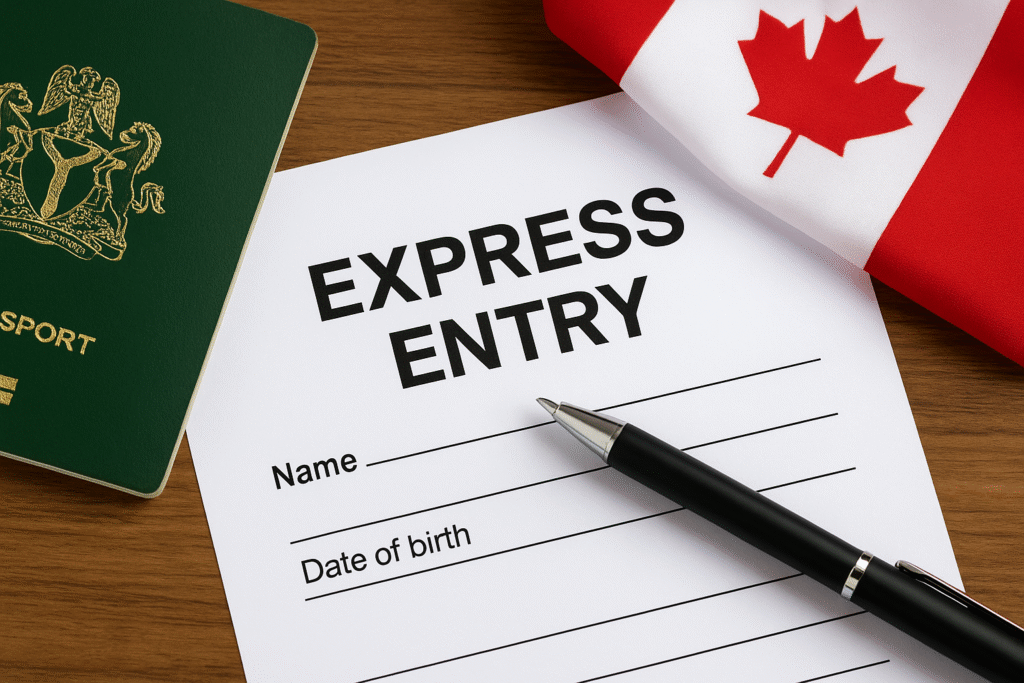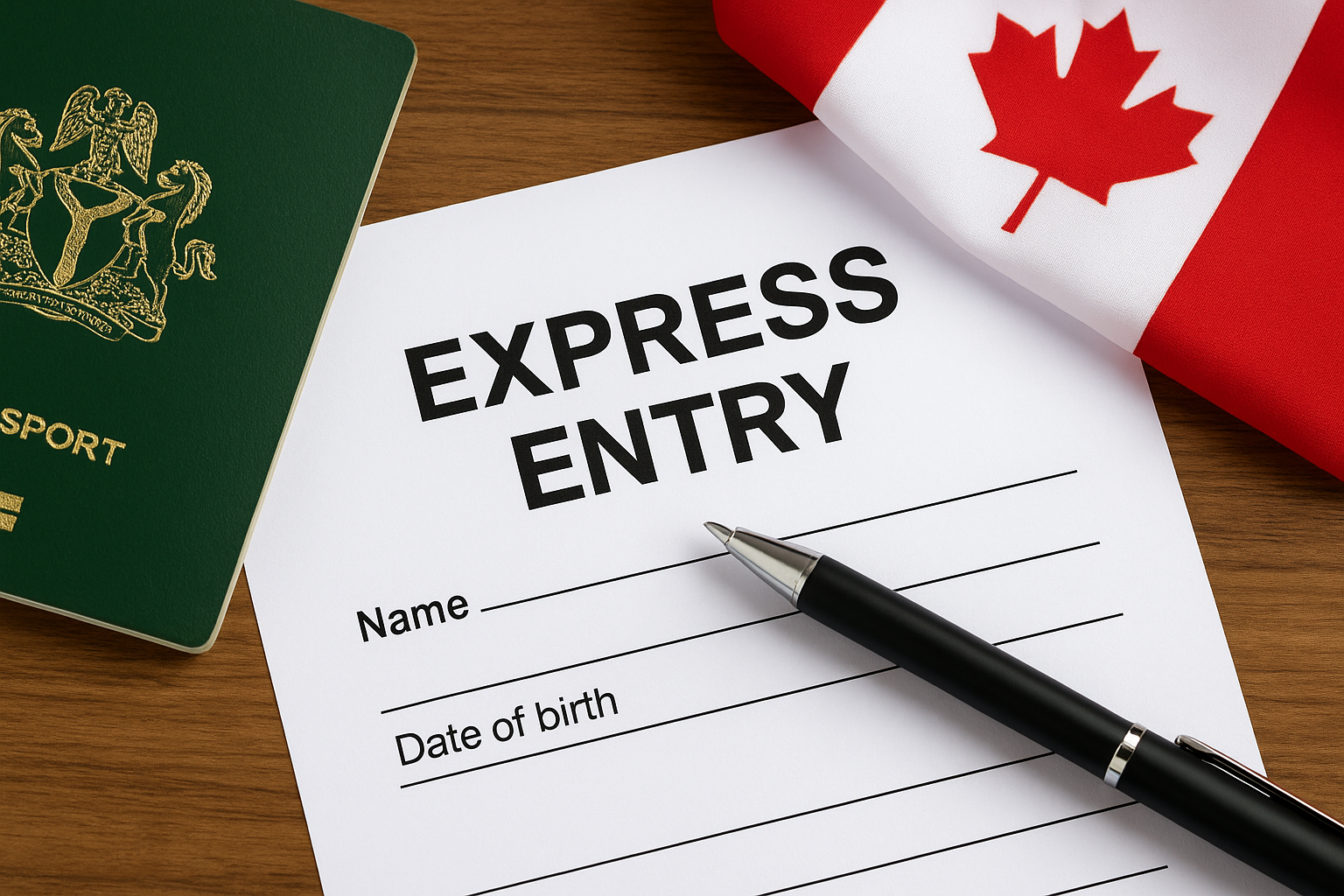Step-by-step guide on the Canadian immigration process for Nigerians. Learn how to qualify for Express Entry, prepare documents, boost CRS scores, and avoid costly mistakes in 2025.

Why Express Entry Matters for Nigerians
If you’re a Nigerian professional dreaming of building a new life in Canada, Express Entry is your most efficient pathway to permanent residence. It’s fast (as little as six months for complete applications), transparent, and merit-based.
But here’s the catch — the system rewards preparation. Many Nigerians lose out due to missing documents, wrong NOC codes, or weak CRS scores. This guide simplifies the Canadian immigration process for Nigerians, walking you through each stage with clarity, practical tips, and insider insights.
Stage 1: Check Your Eligibility (FSWP, CEC, or FSTP)
Before anything else, find out which Express Entry program fits you best:
| Program | Ideal For | Minimum Requirements |
|---|---|---|
| Federal Skilled Worker Program (FSWP) | Nigerians with foreign work experience | 1+ year continuous skilled work (NOC TEER 0, 1, 2, or 3), IELTS, ECA, and proof of funds |
| Canadian Experience Class (CEC) | Those with Canadian work or study experience | 1+ year skilled Canadian work, valid status, and language results |
| Federal Skilled Trades Program (FSTP) | Skilled tradesmen (e.g., welders, electricians) | Certificate of qualification or job offer in Canada |
➡ Tip: Most Nigerians qualify under FSWP — it accepts work experience from Nigeria and doesn’t require a Canadian job offer.
Stage 2: Gather Your Core Documents
This is where most applicants slow down. Prepare the following before creating your Express Entry profile:
- Educational Credential Assessment (ECA):
Have your Nigerian degree or HND evaluated by an approved body like WES, ICES, or IQAS.- Processing time: 4–8 weeks
- Cost: About ₦80,000–₦100,000 (USD 120–150)
- Language Test (IELTS or CELPIP):
You need CLB 7 or higher for most programs.- Target at least IELTS 8/7/7/7 (Listening/Reading/Writing/Speaking) for a competitive CRS.
- Passport: Valid for at least 12 months.
- Work Experience Documents: Reference letters from employers detailing your duties, title, hours, and salary.
- Proof of Funds: Show you can support yourself (and dependents).
- For a single applicant (2025): CAD $14,690 (~₦17 million)
- For a family of four: CAD $27,297 (~₦32 million)
➡ Common Pitfall: Submitting fake or unverifiable bank statements. IRCC can ban you for five years for misrepresentation.
Stage 3: Create Your Express Entry Profile
Once you’ve gathered your documents, create a profile on IRCC’s official portal: https://www.canada.ca/en/immigration-refugees-citizenship.html
You’ll input your:
- Language scores
- ECA results
- Work history (with matching NOC codes)
- Education and family information
At this stage, you’ll receive your Comprehensive Ranking System (CRS) score — out of 1200 points.
➡ Pro Tip: Keep your documents handy and consistent. IRCC double-checks every detail during the later e-APR phase.
Stage 4: Improve Your CRS Score
If your CRS score is below the cutoff (usually 480–510 points), don’t give up. Many Nigerians boost their scores through smart upgrades:
| Method | Average CRS Boost | Notes |
|---|---|---|
| Retake IELTS (aim for CLB 9+) | +40–60 points | Most effective and affordable fix |
| Get a Provincial Nomination (PNP) | +600 points | Guaranteed PR invitation |
| Secure a Canadian job offer | +50–200 points | Must be LMIA-approved |
| Add a spouse’s credentials | +20–30 points | Include ECA and IELTS for your spouse |
| Complete a postgraduate diploma | +15–25 points | Preferably a 1-year Canadian credential |
➡ Use Our Free CRS Calculator: Calculate your estimated CRS score now with our free tool!
Stage 5: Receive an Invitation to Apply (ITA)
When your CRS meets or exceeds the draw cutoff, you’ll get an Invitation to Apply (ITA).
This means IRCC wants you to submit a complete permanent residence application within 60 days.
At this point, start gathering:
- Police certificates (Nigeria Police + any country you’ve lived in >6 months)
- Medical exam (by IRCC-approved panel physicians)
- Updated proof of funds
- Employment letters and tax documents (if available)
Stage 6: Submit Your e-APR and Wait for the Decision
This is the final submission phase, known as the electronic Application for Permanent Residence (e-APR).
- Upload all scanned documents in the IRCC portal.
- Pay the processing fee (CAD $1,525 for single applicants).
- Most decisions take 4–8 months, depending on background checks.
Once approved, you’ll receive your Passport Request (PPR) and eventually your Confirmation of Permanent Residence (COPR).
🎉 Welcome to Canada — your new home!
Common Pitfalls for Nigerian Applicants
Avoid these errors that frequently lead to rejection or bans:
- Fake Documents: IRCC verifies every letter, degree, and statement.
- Wrong NOC Code: Match your job duties to the correct TEER level (check Job Bank Canada).
- Incomplete Proof of Funds: Must be in your name (not borrowed).
- Expired IELTS or ECA: Both valid for 2 and 5 years respectively.
- Missed ITA Deadline: The 60-day window is strict — no extensions.
Related Articles You’ll Find Useful
-
🇨🇦 500+ CRS Points: How to Maximize Your Express Entry Score in 2025
-
🇨🇦 Canada vs UK Immigration Pathways in 2025: Which Is Better for Nigerians?
-
🇩🇪 Germany Job Seeker Visa from Nigeria: Application, Requirements & Success Rate
Final Thoughts
Applying for Canadian PR through Express Entry as a Nigerian can feel overwhelming — but with the right preparation, you can turn your dream into a reality.
Thousands of Nigerians have successfully transitioned in 2025 by following these exact steps — methodically, patiently, and truthfully.
